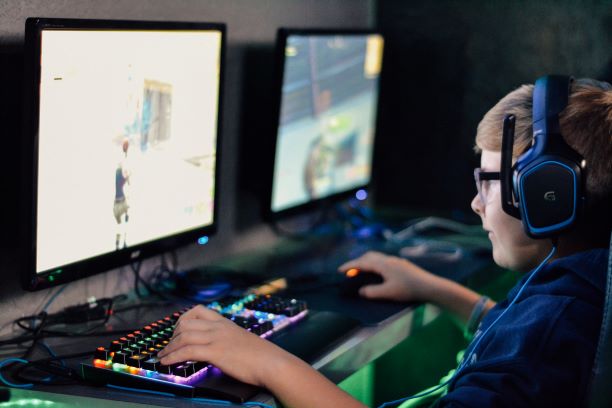
If you are struggling with getting your kids to stop playing Fortnite, then you are not alone. The popular game, Fortnite, has taken over kid’s lives (and their minds). They eat, sleep, and breathe it. They possibly even wear it and carry it on their backs since the back to school shopping merchandise was Fortnite-heavy.
Fortnite-struggling parents, we’re here to help you rescue your kids from this virtual world. Today, we are sharing red flags to watch out for and tips for encouraging responsible playing. Plus, we are including tips for getting your kids to enjoy the best educational apps for kids instead of playing Fortnite only.
No, You’re Not Crazy. Gaming Can Be Addictive.
You may feel silly thinking your kid can be addicted to a video game, but games like Fortnite can be addictive. In fact, they are designed with that purpose in mind. As Game Quitters explains, “Games use state-of-the-art behavioral psychology to intentionally keep you hooked and increasingly… to spend more money. The gaming industry describes this as making a game ‘engaging’ and ‘immersive,’ but what this really means is that Fortnite addiction is by design.”
Furthermore, video game addiction is now labeled a “gaming disorder” behavioral addiction by the World Health Organization. More and more therapists are treating kids who suffer from this type of gaming disorder. There are even video game and digital detox rehabs for kids and teens.
With its widespread popularity and parents claiming they have a hard time getting their kids to stop playing, it is not a surprise that a quick Google search of Fortnite addiction amassed 8 million results. However, it is essential to note that just because your kid loves playing Fortnite does not mean he or she is addicted. Many families have learned how to embrace Fortnite without it taking over. Let’s talk about how to tell if it is a problem and how to prevent it from becoming one.
Fortnite Red Flags
When it comes to identifying a potential gaming addiction, there are some definite red flags. According to a report by NPR, “The criteria [for gaming disorder] doesn’t include a certain amount of hours spent playing. Instead, the description is of someone with an inability to stop playing even though it interferes with other areas of one’s life, such as family relationships, school, work, and sleep.” So, the key is whether or not Fortnite begins to interfere with your child’s daily life.
Additionally, here are some other red flags:
- Loss of interest in other hobbies
- Can’t stop playing when asked or told to
- Irritable when not playing
- Craving more and more time to play
- Lying about time played or money spent
How to Help Your Kid Play Fortnite Responsibly
Again, Fortnite is not a problem for every kid. Some educators even suggest Fortnite can be educational and reinforce learning skills. Let’s look at some steps you can take to make sure your child doesn’t become trapped in the addictive Fortnite world.
- Set clear screentime boundaries. For instance, some parents only allow their child to play Fortnite on the weekends. Other parents only allow their kid to play for a certain amount of time in the after school.
- Monitor your child’s Fortnite play. The best way to make Fortnite safe for your child is to watch and play with him or her. You should also monitor your child’s behavior before, during, and after playing.
- Stick to the rules. Your family rules should still apply when your child is playing the game. For example, if you do not allow your kid to talk a certain way in the house, then he or she shouldn’t use inappropriate language while playing the game. If your child has a thirty-minute daily allotment of Fortnite time, stick to it. Set the alarm. If you lapse on keeping to the screen time rules, your kid will know.
For more tips, check out Child Mind Institute’s A Parent’s Guide to Dealing With Fortnite and Game Quitters’ Parents Guide to Fortnite Addiction.
Shift Their Attention to the Best Learning Apps for Kids
If your child loves Fortnite, you should look for games for 8-year-olds and older that are designed with gamification. The reason kids love Fortnite is that it uses gamification with cool interactive elements and continuous rewarding.
Fortunately, many of the best learning apps for kids today are designed with gamification, too. Give your child an allotted amount of Fortnite time and then encourage him or her to choose one of the educational apps from GoKid’s list of the Top 10 Apps For Kids 8-12 In 2019.







0